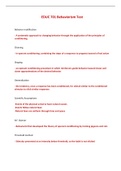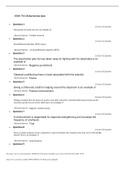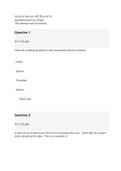Behaviorism educ 701 Study guides, Class notes & Summaries
Looking for the best study guides, study notes and summaries about Behaviorism educ 701? On this page you'll find 23 study documents about Behaviorism educ 701.
Page 2 out of 23 results
Sort by
![EDUC 701 Behaviorism Quiz: Education 701 Questions and Answers [Graded A] Liberty University • Question 1 2.5 out of 2.5 points Giving a child extra credit for helping around the classroom is an example of Selected Answer: Positive reinforcement. • Questi](/docpics/637c73f123d0f_2125413.jpg)
-
EDUC 701 Behaviorism Quiz: Education 701 Questions and Answers [Graded A] Liberty University • Question 1 2.5 out of 2.5 points Giving a child extra credit for helping around the classroom is an example of Selected Answer: Positive reinforcement. • Questi
- Exam (elaborations) • 6 pages • 2022
-
- $8.49
- + learn more
EDUC 701 Behaviorism Quiz: Education 701 Questions and Answers [Graded A] Liberty University • Question 1 2.5 out of 2.5 points Giving a child extra credit for helping around the classroom is an example of Selected Answer: Positive reinforcement. • Question 2 2.5 out of 2.5 points Connectionism theory is best associated with this scientist. Selected Answer: Thorndike • Question 3 2.5 out of 2.5 points Generalization occurs when people respond similarly to stimuli that have common features...
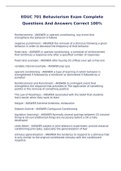
-
EDUC 701 Behaviorism Exam Complete Questions And Answers Correct 100%
- Exam (elaborations) • 4 pages • 2023
-
- $9.99
- + learn more
Reinforcement - ANSWER in operant conditioning, any event that strengthens the behavior it follows negative punishment - ANSWER the removal of a stimulus following a given behavior in order to decrease the frequency of that behavior fixed ratio - ANSWER in operant conditioning, a schedule of reinforcement that reinforces a response only after a specified number of responses fixed ratio example - ANSWER after buying 10 coffees your get a free one variable interval example - ANSWER pop...
EDUC 701 Learning Theories - Behaviorism Test |EDUC 701 Learning Theories - Behaviorism Test
EDUC 701 ; BEHAVIORISM QUIZ
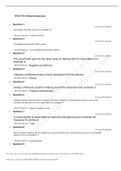
-
EDUC 701 EDUC 701 Behaviorism Test. Questions & Answers. Already Graded A
- Exam (elaborations) • 3 pages • 2021
-
- $8.49
- 1x sold
- + learn more
EDUC 701 EDUC 701 Behaviorism Test. Questions & Answers. Already Graded A EDUC 701: Behaviorism Quiz Question 1 2.5 out of 2.5 points Pop quizzes in math class are an example of Selected Answer: Variable-interval. Question 2 2.5 out of 2.5 points Unconditioned stimulus (UCS) causes Selected Answer: an unconditioned response (UCR). Question 3 2.5 out of 2.5 points The preschooler gets his toys taken away for fighting with his classmates is an example of Selected Answer: Negative puni...
![EDUC 701 Behaviorism Quiz: Education 701 Questions and Answers [Graded A] Liberty University](/docpics/606dae826257c_1049475.jpg)
-
EDUC 701 Behaviorism Quiz: Education 701 Questions and Answers [Graded A] Liberty University
- Exam (elaborations) • 6 pages • 2021
-
- $37.40
- 9x sold
- + learn more
• Question 1 2.5 out of 2.5 points Giving a child extra credit for helping around the classroom is an example of Selected Answer: Positive reinforcement. • Question 2 2.5 out of 2.5 points Connectionism theory is best associated with this scientist. Selected Answer: Thorndike • Question 3 2.5 out of 2.5 points Generalization occurs when people respond similarly to stimuli that have common features, whereas discrimination occurs when people respond di...
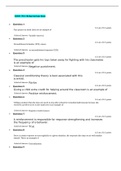
-
EDUC 701 Behaviorism Quiz
- Exam (elaborations) • 3 pages • 2022
-
- $11.49
- + learn more
• Question 1 Pop quizzes in math class are an example of Selected Answer: Variable-interval. • Question 2 Unconditioned stimulus (UCS) causes Selected Answer: an unconditioned response (UCR). • Question 3 2.5 out of 2.5 points 2.5 out of 2.5 points 2.5 out of 2.5 points The preschooler gets his toys taken away for fighting with his classmates is an example of Selected Answer: Negative punishment. • Question 4 Classical conditioning theory...
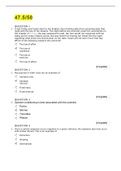
-
EDUC 701 Behaviorism Quiz 1 Questions and Answers.
- Exam (elaborations) • 5 pages • 2021
-
- $14.00
- 5x sold
- + learn more
47.5/50 QUESTION 1 1. It was Friday and Susan went to her English class thinking about her upcoming date that night with the boy of her dreams. The night before she tried but could not concentrate on the chapter of Ivanhoe she was supposed to read. Her hair would not cooperate with her today and to make matters worse, she was tired from texting her friend into the night regarding what shoes she should wear on her date. Susan did not learn much that day. Which of the following explains this...
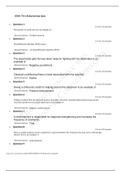
-
EDUC 701EDUC 701 Behaviorism Test. Questions & Answers. A Graded.
- Exam (elaborations) • 3 pages • 2021
-
- $10.49
- 1x sold
- + learn more
EDUC 701: Behaviorism Quiz Question 1 2.5 out of 2.5 points Pop quizzes in math class are an example of Selected Answer: Variable-interval. Question 2 2.5 out of 2.5 points Unconditioned stimulus (UCS) causes Selected Answer: an unconditioned response (UCR). Question 3 2.5 out of 2.5 points The preschooler gets his toys taken away for fighting with his classmates is an example of Selected Answer: Negative punishment. Question 4 2.5 out of 2.5 points Classical cond...
Chapter 3 in textbook learning theories quiz

That summary you just bought made someone very happy. Also get paid weekly? Sell your study resources on Stuvia! Discover all about earning on Stuvia

